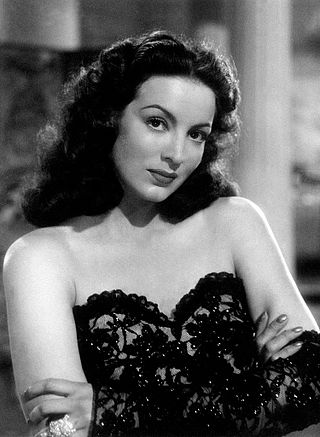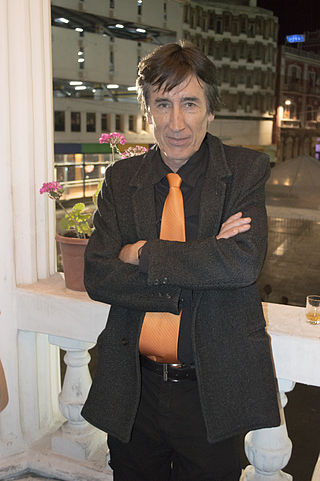
María de los Ángeles Félix Güereña was a Mexican actress and singer. Along with Pedro Armendáriz and Dolores del Río, she was one of the most successful figures of Latin American cinema in the 1940s and 1950s. Considered one of the most beautiful actresses of the Golden Age of Mexican cinema, her strong personality and taste for finesse garnered her the title of diva early in her career. She was known as La Doña, a name derived from her character in Doña Bárbara (1943), and María Bonita, thanks to the anthem composed exclusively for her as a wedding gift by Félix's second husband, Agustín Lara. Her acting career consists of 47 films made in Mexico, Spain, France, Italy and Argentina.
Ecuador is a multicultural and multiethnic nation, with the majority of its population is descended from a mixture of both European and Amerindian ancestry. The other 10% of Ecuador's population originate east of the Atlantic Ocean, predominantly from Spain, Italy, Lebanon, France and Germany. Around the Esmeraldas and Chota regions, the African influence would be strong among the small population of Afro-Ecuadorians that account for no more than 10%. Close to 80% of Ecuadorians are Roman Catholic, although the indigenous population blend Christian beliefs with ancient indigenous customs. The racial makeup of Ecuador is 70% mestizo, 7% Amerindian, 12% White, and 11% Black.

Jorge Enrique Adoum was an Ecuadorian writer, poet, politician, and diplomat. He was one of the major exponents of Latin American poetry. His work received such prestigious awards as the first Casa de las Américas Prize in Cuba, the most important honor in Latin American letters. Though hailed by Nobel Prize winner Pablo Neruda as the best poet of his generation in Latin America, Adoum’s work is unknown in the English-speaking world.

Alfredo Pareja Diezcanseco — born Alfredo Pareja y Díez Canseco — was a prominent Ecuadorian novelist, essayist, journalist, historian and diplomat. An innovator of the 20th-century Latin American novel, he was a founding member of the literary Grupo de Guayaquil, which brought a new emphasis to realistic novels.

Juan Carlos Mundin-Schaffter, known as Carlos Thompson, was an Argentine actor.

Jorge Icaza Coronel, commonly referred to as Jorge Icaza, was a writer from Ecuador, best known for his novel Huasipungo, which brought attention to the exploitation of Ecuador's indigenous people by Ecuadorian whites.
The Xavier Villaurrutia Award is a prestigious literary prize given in Mexico, to a Latin American writer published in Mexico. Founded in 1955, it was named in memory of Xavier Villaurrutia.

Enrique Domingo Dussel Ambrosini was an Argentine-Mexican academic, philosopher, historian and theologian. He served as the interim rector of the Universidad Autónoma de la Ciudad de México from 2013 to 2014.
The cinema of Ecuador has a long history, including both short and feature-length films made throughout the 20th century, but until recently Ecuadorian film has generally not had a large impact.
Gerardo Guevara is one of the key composers in Ecuador. His work combines native music with contemporary techniques.

Instituto Nacional Mejía is a public secondary educational institution of Quito. It was founded on June 1, 1897 by Eloy Alfaro Delgado, then president of Ecuador.

Sabina Berman Goldberg is a writer and journalist. Her work deals mainly with issues related to diversity and its obstacles. She is a four-time winner of the National Playwriting Award in Mexico and has twice won the National Journalism Award. Her plays have been staged in Canada, North America, Latin America, and Europe. Her novel, Me has been translated into 11 languages and published in over 33 countries, including Spain, France, the United States, England, and Israel.

Camilo Luzuriaga is an Ecuadorian film producer, actor, writer, photographer, and director.
Diego Luzuriaga is an Ecuadorian composer of classical music.
Armonía Liropeya Etchepare Locino was a Uruguayan feminist, pedagogue, novelist and short story writer. She was sometimes referred to as Armonía Etchepare de Henestrosa or, by her pseudonym, Armonía Somer. A member of the literary movement Generación del 45, Somers wrote in a transgressive style. Her contemporaries included Silvina Ocampo, Griselda Gambaro, Luisa Valenzuela, Elena Garro, and Peri Rossi.

The 38th Ariel Awards ceremony, organized by the Mexican Academy of Film Arts and Sciences (AMACC) took place on July 22, 1996, in Mexico City. During the ceremony, AMACC presented the Ariel Award in 25 categories honoring films released in 1995. Sin Remitente received four awards out of 14 nominations, including Best Picture and Best Director for Carlos Carrera. La Reina de la Noche was the most awarded film with six awards; La Línea Paterna and Sobrenatural with three; Dulces Compañías, El Anzuelo and Mujeres Insumisas with two; and Entre Pancho Villa y Una Mujer Desnuda, Domingo Siete, De Tripas, Corazón, and El Abuelo Cheno y Otras Historias with one.
Juana Guarderas Albuja is an Ecuadorian theatre, cinema, and television actress. She has been the director of the Quito Comedy Club since 1990.

Marcelo Enrique Leonart Tomas is a Chilean writer, filmmaker, and theater director.
Mercedes Rein was a Uruguayan writer, translator, and dramatist.
Juan Valdano Morejón is an Ecuadorian writer. He was born in Cuenca in 1939. He studied at the University of Cuenca, Complutense University of Madrid and the University of Aix-en-Provence. He taught literature and literary theory at the University of Cuenca and at the Pontificia Universidad Católica del Ecuador.











